Beef Tenderloin with Red Wine Sauce
- By Jennifer Segal
- November 29, 2024
- 1,358 Comments
- Leave a Review

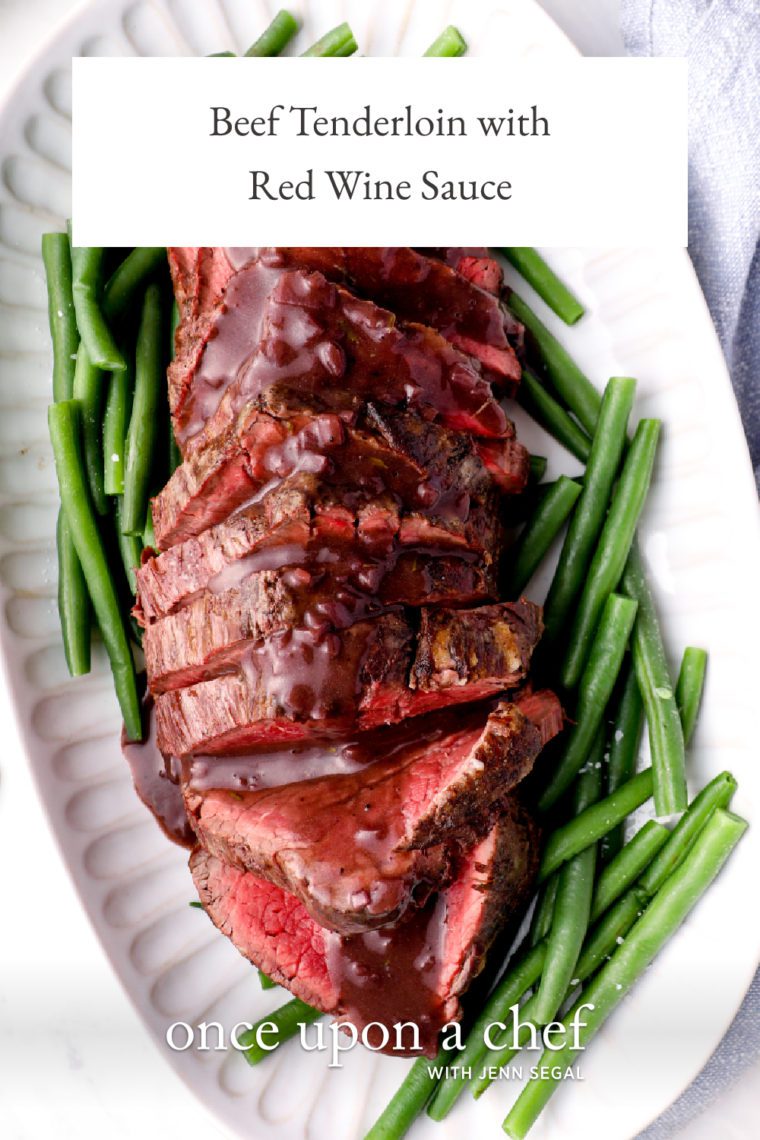
This post may contain affiliate links. Read my full disclosure policy.
This beef tenderloin looks fancy, but it couldn’t be easier to make. It cooks up perfectly every time, and the rich red wine sauce takes it over the top. A total showstopper for any special dinner.
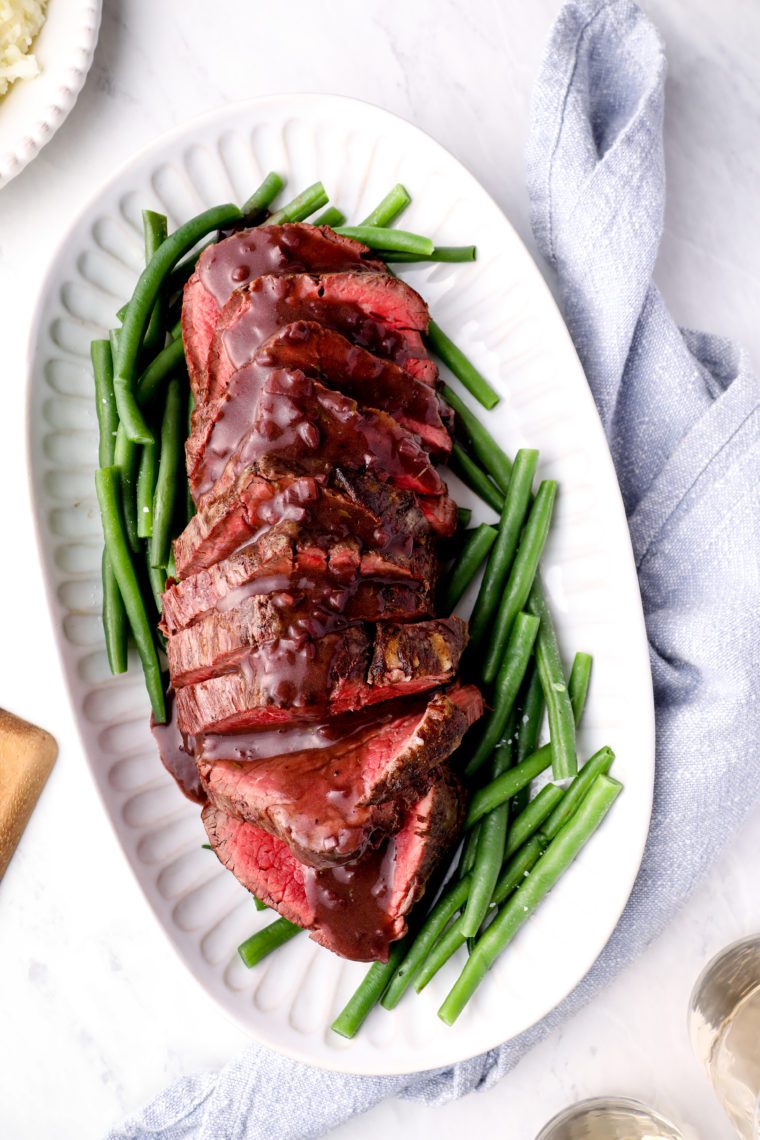
This beef tenderloin recipe is my #1 go-to for holidays and special occasions. It never fails to impress, and my foolproof method ensures perfectly cooked beef every time, with no guesswork! The tenderloin is paired with a red wine reduction sauce—made by simmering wine, broth, and aromatics until the flavors concentrate, then finished with butter for a silky, gorgeous sauce that rivals anything you’d order at a fine restaurant—yes, it’s fancy!
A great bonus is that the sauce can be prepared mostly in advance, so there’s very little fussing at the last minute. Similar to my pork tenderloin, this recipe is truly the best of both worlds: simple to prepare yet incredibly delicious.
“Voted best Christmas dinner ever!”
What You’ll Need To Make Beef Tenderloin with Red Wine Sauce
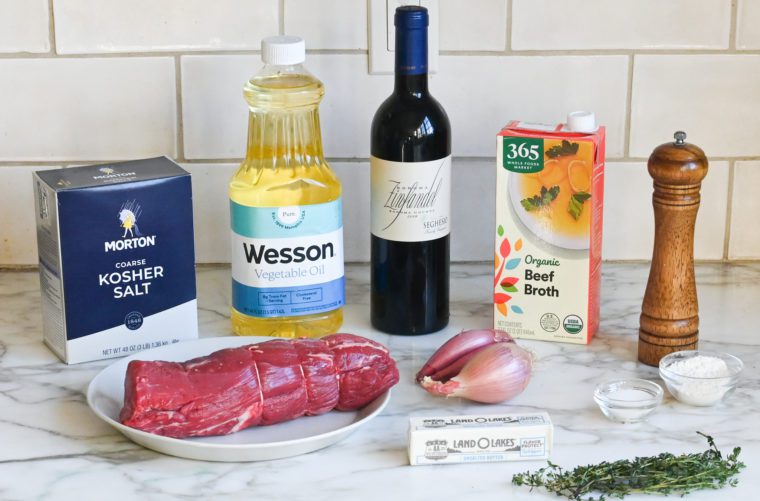
- Beef tenderloin: The most tender and expensive cut of beef, this is the whole piece before it’s sliced into steaks, which are known as filet mignon (great for recipes like steak au poivre or pan-seared steaks). As a general rule, plan for about ½ pound per person for a generous serving. Your tenderloin may be tied with butcher’s twine near the tapered end to keep it evenly thick; leave the string on until after it is cooked. If it’s not tied, no worries—no tying is necessary.
- Butter: A portion is used for sautéing shallots, while the rest is combined with flour to create a beurre manié, which thickens the sauce.
- Shallots: Adds a mild onion flavor to the sauce.
- Red wine: Adds rich, fruity flavors and depth of color to the sauce. Any variety, such as Merlot, Pinot Noir, Cabernet Sauvignon, Syrah, or Red Zinfandel, will work. When cooking with wine, choose an inexpensive bottle that’s still enjoyable to drink. Avoid supermarket “cooking wines,” which often contain salt and additives.
- Beef broth: Provides a savory base for the sauce; also used to deglaze the pan after roasting the beef.
- Thyme sprigs: Adds earthy, aromatic flavor to the sauce.
- All-purpose flour: Mixed with butter to create a beurre manié, a thickening agent for the sauce.
- Jump to the printable recipe for precise measurements
Step-by-Step Instructions
Make the Sauce: Melt the butter in a saucepan and cook the shallots over medium-low heat until soft. Add the wine, broth, thyme, salt, pepper, and sugar, then bring to a boil. Simmer for 30 minutes until reduced by half. In a small bowl, mix a few more tablespoons butter with flour to form a paste. Gradually whisk the paste into the sauce and simmer until thickened. The sauce can be made a few days ahead up to this point.

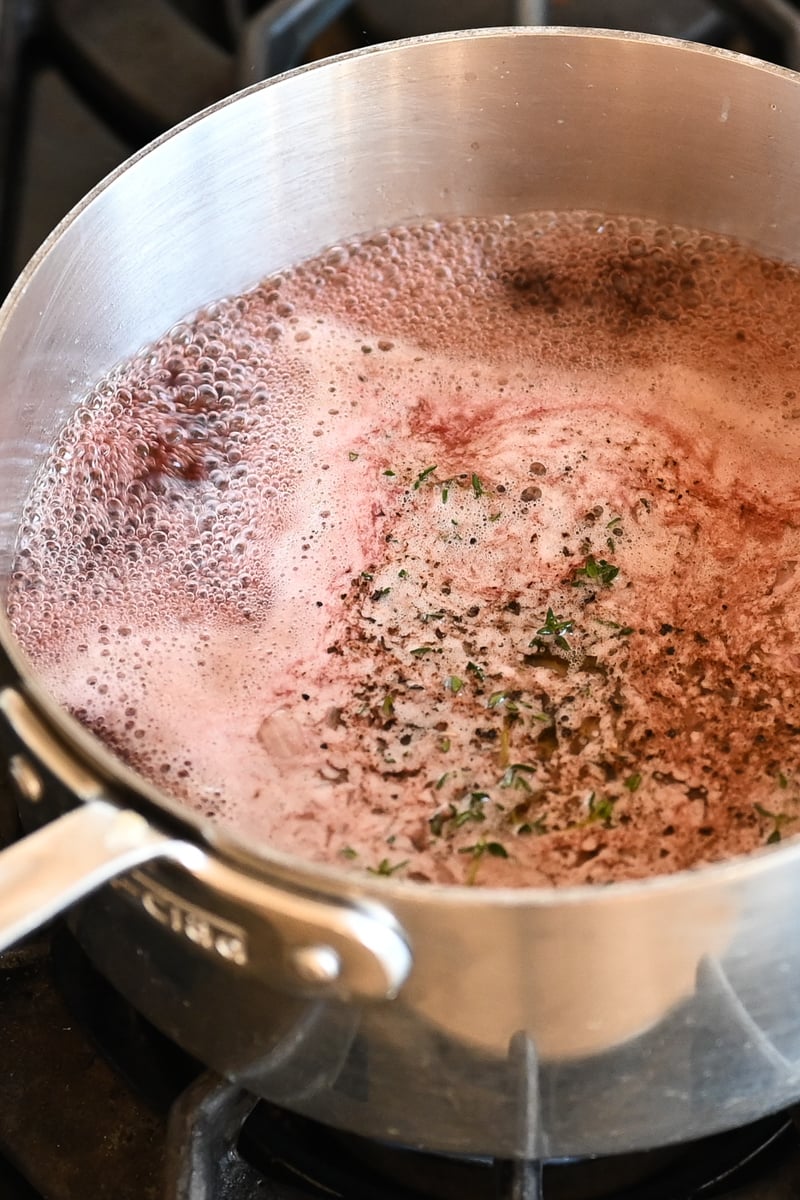


Sear & Roast the Beef Tenderloin: Season the beef with kosher salt and freshly ground black pepper. Don’t be shy with the seasoning; it needs a lot!

Heat the oil in an oven-proof skillet over medium-high heat until almost smoking. Cook until well browned with a nice crust on all but one side. Turn the tenderloin so that the un-seared side is down and transfer the skillet directly to a 400°F oven. I recommend using a leave-in meat thermometer with a remote monitor to keep an eye on the roast. These are ideal for cooking pricey cuts like tenderloin (they’re great for other dishes too, like turkey).

Roast until cooked to your liking, keeping in mind that the the internal temperature will continue to rise 5 to 10 degrees after being removed from the oven—this is known as carryover cooking.
Rare: 115°F-120°F
Medium Rare: 120°F-125°F
Medium: 130°F-135°F
Medium-Well: 140°F-145°F
Well Done: 150°F and above
Finish the Sauce and Carve the Beef: Set the pan on the stovetop, add the broth, and bring to a boil, deglazing by scraping up the brown bits with a wooden spoon. Add this flavorful broth to the wine sauce and bring it to a simmer.

Carve the roast into slices and serve, passing the red wine sauce at the table. The tenderloin is wonderful served over mashed potatoes with a simple vegetable, like French green beans or roasted Brussels sprouts.

You May Also Like
Beef Tenderloin with Red Wine Sauce
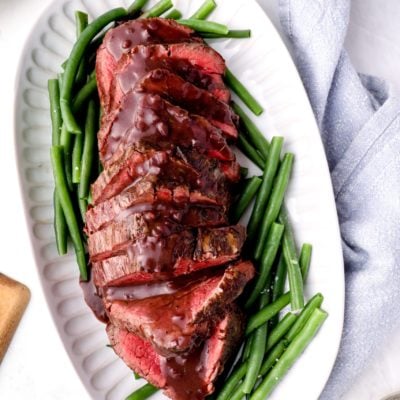
Ingredients
For the Sauce
- 8 tablespoons unsalted butter, divided
- ¾ cup finely chopped shallots, from 2 to 3 large shallots
- 1¼ cups red wine
- 3 cups beef broth
- 6 fresh thyme sprigs
- ¼ teaspoon kosher salt
- ⅛ teaspoon freshly ground black pepper
- 1 teaspoon sugar
- 2 tablespoons all-purpose flour
For the Beef
- 1 (2 to 3 lb) center-cut beef tenderloin roast
- Kosher salt (½ teaspoon per pound of beef)
- Freshly ground black pepper (¼ teaspoon per pound of beef)
- 2 tablespoons vegetable oil
- ¼ cup beef broth
Instructions
For the Sauce
- Melt 5 tablespoons of the butter in a medium saucepan. Add the shallots and cook over medium-low heat, stirring occasionally, until soft and translucent, 7 to 8 minutes. Add the wine, beef broth, thyme sprigs, salt, pepper and sugar, and bring to a boil. Cook over medium heat for about 30 minutes, or until the liquid is reduced by about half.
- While the liquid is reducing, place the remaining 3 tablespoons of butter in a small bowl and soften in the microwave, if necessary (it should be soft but not melted). Add the flour and, using a small spoon, mix into a smooth paste.
- Once the wine mixture is reduced, reduce the heat to low and remove the thyme sprigs. Whisk the flour-butter paste, a tablespoon at a time, into the simmering liquid, and simmer for a few minutes, until the sauce is thickened. Set aside. (The sauce can be made up to this point and refrigerated up to 3 days ahead of time.)
For the Tenderloin
- Let the beef stand at room temperature for 1 hour before roasting. Set an oven rack in the middle position and preheat the oven to 400°F (205°C).
- Season the beef all over with kosher salt and pepper. Heat the oil in an oven-proof skillet over medium-high heat until almost smoking. Cook, turning with tongs, until well browned on all but one side, about 10 minutes total. Turn the tenderloin so that the un-seared side is down, and transfer the skillet directly to the preheated oven. (If your pan isn't oven-proof, transfer the beef to a lightly oiled roasting pan.) Roast until a thermometer inserted into the center of the meat registers 120°F to 125° (49°C to 52°C) for medium rare, about 15 minutes, or until done to your liking (115°F to 120°F/46°C to 49°C for rare, 130°F to 135°F/54°C to 57°C for medium). Keep in mind that these temperatures account for the fact that the temperature will continue to rise about 5 degrees while the meat rests.
- Transfer the meat to a carving board (preferably with a well for collecting juices) and let it rest, covered loosely with aluminum foil, for 10 to 15 minutes. Place a dishtowel or oven mitt over the handle of the roasting pan to remind yourself that it's hot.
- Meanwhile, carefully discard the fat from the roasting pan (remember that the handle is hot!). Set the pan on the stovetop and add the ¼ cup (60 ml) of broth. Bring the broth to a boil and, using a wooden spoon, scrape the fond, or brown bits, from the bottom of the pan. Add the flavorful broth to the red wine sauce, and then bring the sauce to a simmer.
- Carve the tenderloin into ½-inch (13-mm) thick slices. Serve the beef, passing the red wine sauce at the table.
Pair with
Nutrition Information
This website is written and produced for informational purposes only. I am not a certified nutritionist and the nutritional data on this site has not been evaluated or approved by a nutritionist or the Food and Drug Administration. Nutritional information is offered as a courtesy and should not be construed as a guarantee. The data is calculated through an online nutritional calculator, Edamam.com. Although I do my best to provide accurate nutritional information, these figures should be considered estimates only. Varying factors such as product types or brands purchased, natural fluctuations in fresh produce, and the way ingredients are processed change the effective nutritional information in any given recipe. Furthermore, different online calculators provide different results depending on their own nutrition fact sources and algorithms. To obtain the most accurate nutritional information in a given recipe, you should calculate the nutritional information with the actual ingredients used in your recipe, using your preferred nutrition calculator.
See more recipes:
Comments
Add a Comment Cancel reply
This site uses Akismet to reduce spam. Learn how your comment data is processed.
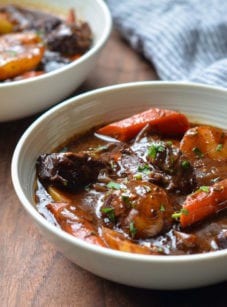
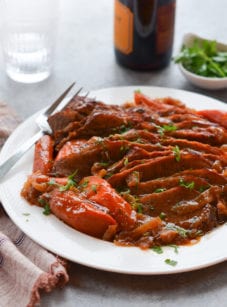


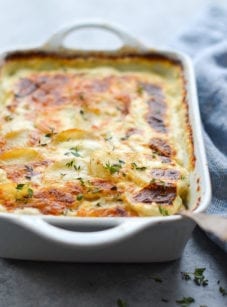
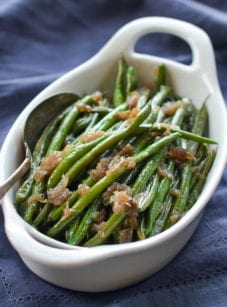

OMG! This was beyond tender and absolutely delicious. I served it at Christmas and again this easter. My crew couldn’t get enough at either meal! Its elegant simplicity has made it a new “go to” for sure. Thank you for sharing the recipe for this incredible feast – a true crowd pleaser.
Hi Jenn, how can I adjust the recipe to serve 12 people?
Hi Steve, Depending on what else you’re serving, you’ll need 5 to 6 pounds. I’d buy larger tenderloins but make sure they’ll still fit in your skillet for searing, and keep in mind that they will take longer to cook. Also, you’ll need to make more sauce (and with a larger quantity, it will take longer to reduce). Hope that helps and that everyone enjoys!
Hi Jenn,
Thank you for sharing all your amazing recipes!
I was considering making the Roast Beef Tenderloin and Red Wine sauce recipe but I just know it will be too expensive a cut of beef. Could you recommend a cut of beef roast that I could make that would be more reasonably priced?
Gratefully,
Catherine
Hi Catherine, this would also work nicely with flat iron steak. Hope you enjoy!
Hello,
Can you use a “peeled” tenderloin?
Thank you
Yep, that’s fine! Enjoy 😊
I used this tenderloin recipe for my Christmas dinner this year. It was my first time cooking a beef tenderloin and I was nervous. Your recipe was easy to follow and it turned out
SO GOOD!!!! I will definitely make this again. Also, the wine sauce was to die for. Everyone raved about it. We cooked it as written but then added mushrooms. Also made your scalloped potatoes and they were fantastic!
I have to confess I was very nervous about cooking a huge beef fillet having never done it before but your recipe made the whole process very straightforward and utterly delicious! I have printed it off and will do it again – thank you!
This sauce was to die for! Yum, so good! And I didn’t even use real butter, but a butter substitute to make it dairy-free. The cut of beef was expensive but worth it for our Christmas dinner. Everyone raved. We paired it with a puff pastry shaped like a Christmas tree that was filled with smoked Gouda and ham and it was delectable dipped in the sauce. I put the sauce on everything after the beef was gone!
This is the second year I have made this and the red wine sauce doesn’t really thicken. This year I started the sauce 2 hrs early and really boiled it. It reduced to what I thought was half but didn’t really thicken the flour butter mixture. Maybe it’s supposed to be runny?
The taste is fine, and the consistency is disappointing.
Same thing happened for me. Is it suppose be more like an au jus consistency?
Hi Todd, it’s really not supposed to have an au jus consistency. It’s not quite as thick as a gravy, but should definitely have a bit of thickness. If you try it again and are still struggling with it, try adding a bit more of the butter/flour mixture.
Is there a way to make this sauce gluten free? What might I substitute?
Hi Liz, you can use gluten-free flour here. Hope you enjoy!
Third time making this delish tenderloin. Despite discovering my finicky oven turning off and the meats temp at 100 degrees, I was able to finish cooking to perfection per your instructions. We also enjoyed the sauce and your recipe for au gratin potatoes.Our guests were just thrilled.
Thank you much for your culinary expertise.
Jenn,
I’ve been using your recipes for about 4 years, and you never disappoint. With this one, though, you out-did yourself.
My family and I absolutely loved it. My wife said: “This is the best meat you’ve ever made.” She normally doesn’t care for steak that much.
I was a bit intimidated by the price of the cut and the method. I usually stick to tri tip or ribeye and use the grill, but you had me pan searing and making a fancy wine sauce. You made it so easy that even I couldn’t screw it up.
This one is awesome! Thanks Jenn!